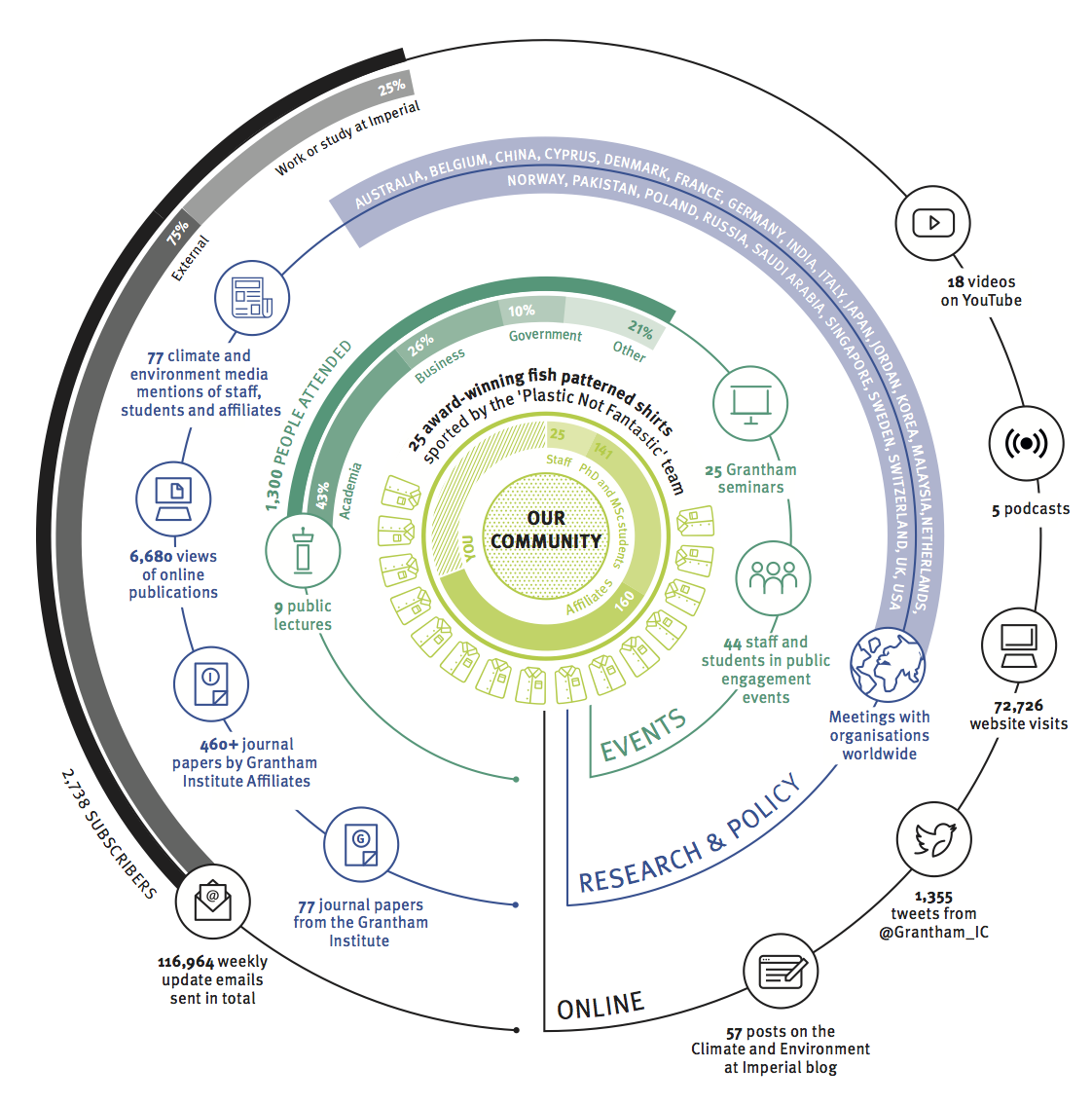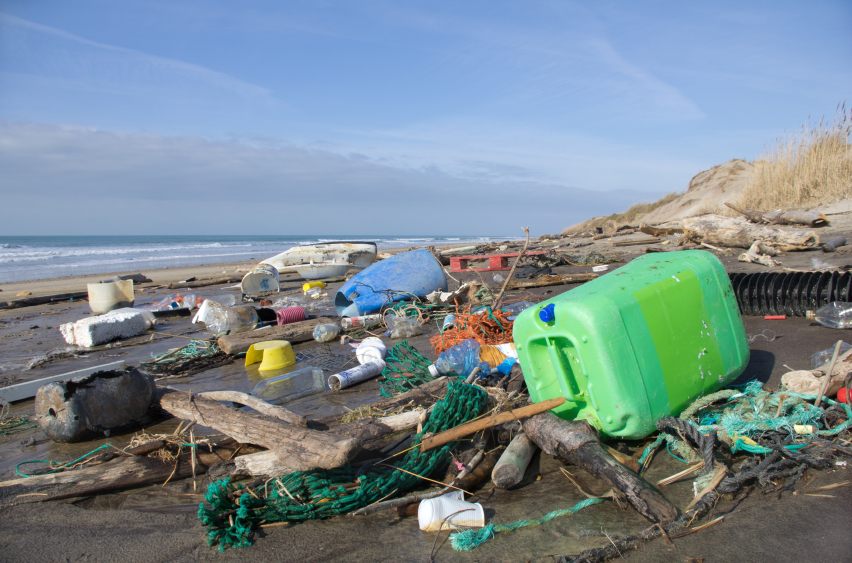Universities are sitting on a vast swathe of untapped knowledge. Whilst academics make it their business to prioritise the delivery of excellent, peer-reviewed scientific papers, these are often shared only within confined academic circles. By presenting this information in different formats to new audiences it is possible to forge more and various effective conduits to the non-academic world.
Set up in 2007, the Grantham Institute of Climate Change and the Environment at Imperial College aims to do just this. Alyssa Gilbert, Director of Policy and Translation, explains the institute's mission and impact, and reflects upon it's broader role in academia.
The Grantham Institute was set up in 2007 aiming to mobilise the excellent science and engineering at Imperial College London to tackle the world’s most pressing environmental problems – including climate change1. The Institute aims to stimulate new multi-disciplinary research, train leaders of the future, translate our research into information for audiences outside academia and to stimulate innovation.
A small group of about 25 staff members make up the heart of the Institute. We work together in a dedicated space on Imperial’s South Kensington campus. The core staff run our educational programmes (Masters and PhD programmes), help manage large multi-disciplinary research programmes, build and manage structured incubators, accelerators and other commercialisation machinery and actively build routes for engagement and translation of research.

Our model is that of a hub that creates strong connections to academics in each of Imperial’s departments and faculties. In this manner, we are making the most of the university’s internationally-recognised academic staff, and providing them with professional skills, and in some cases funding, to help mobilise their research in relation to global challenges. We have also made three academic appointments jointly with departments, which strengthens the link between the Institute and the research engines of the university. To complement our role as a hub for researchers across the university, our institute’s core staff also includes a handful of researchers, who work at the heart of multidisciplinary research projects – for example, running our energy modelling activity.
Sometimes we build on existing research, on other occasions we support researchers in building multidisciplinary research programmes. We hosted, for example, a large research project on decarbonisation pathways – the AVOID programme from 2009-2016 – and used expertise from across Imperial, along with the Met Office, the Walker Institute at the University of Reading and the Tyndall Centre.
Our stable core funding allows us to focus valuable time on engagement, translation and communication of research that are usually beyond the scope of classical research grants.
A trove of untapped knowledge
Much of our work is focussed on improving the distribution and dissemination of knowledge on global challenges – but why is this really important?
Whilst academics focus on producing excellent, peer-reviewed scientific papers, these are primarily consumed inside tight academic circles at conferences or through recognised academic journals. Even when these articles are made available through open-sourced periodicals – the number of which is increasing – the readership of these journals is often restricted to those very close to the academic sphere.
The choice of language, writing style and focus of many of these posters, papers and presentations can add barriers to effective wider dissemination to policy makers, business leaders and the public. In addition, academic papers often focus in on quite specific advances in knowledge. As a result, important basic knowledge and key findings might not be repeated frequently enough. The Grantham Institute, and others like it, have the potential to bridge the gap between this hive of knowledge creation and the world outside academia.
A few other universities in the UK have set up institutions with similar goals, some with more focus on the research side, others on education, and each looking at different elements of global challenges, for example the Walker Institute at the University of Reading, or the Tyndall Centre which spans the University of East Anglia and Manchester University. We have sister Grantham institutes at Sheffield University and the London School of Economics, and the Priestly Centre at Leeds University is focussed on similar aspects of climate change to ourselves.
One of our goals, in reaching out beyond academia, is to support strong evidence-based policy making. We also find peers pursuing this goal outside universities, for example amongst the learned societies, such as the Royal Society, Institute of Physics and others, as well as some membership organisations such as the Aldersgate group, and some elements of more traditional advocacy organisations like the Green Alliance.
Broad buy-in
As a hub within the university, we rely on both the buy-in of the university’s leadership and engagement and support from researchers across all of the departments – the grass-roots of the university.
High-level buy-in stems from a university-wide commitment to making an impact on public policy, or tackling global challenges like climate change. With this high-level support, the Institute can use the university’s name when responding to Parliamentary consultations, or publishing articles that seek to have influence on an issue of global importance. With central university support, it is also more likely that the academics we rely on to work with us on translating and disseminating their research are willing to do so because they are more likely to receive recognition for these activities that do not deliver in the traditional academic sense.
Grass roots support comes from researchers whose credible academic voices we need. Their willingness to work with us to explain their findings in writing, and all different forms of media – both traditional and new – are vital to our success.
A channel for communicaton
But surely, you might wonder, if we have the commitment at grass roots level and the top of the university to deliver on these goals, why is an additional institution required at all? I have a few thoughts on this too.
Firstly, academia can function a bit like an ecosystem of individuals. As a result, the impact agenda for their research is left to individuals. Whilst some individuals are extremely active and able in reaching out and making their knowledge accessible, both literally and figuratively, to audiences outside academia, the majority are not. The reasons why academics do not engage outside academia relate to time availability, skills, motivations and broader interest. However, with the focus of an institution that can house specialist communications skills and coordinate and support these activities, these proactive individuals can achieve more, and others can also be brought into the fold.
Second, I believe that institutions like the Grantham bring focus to these dissemination activities. There is so much research going on at any one time, and by funnelling dissemination through an institute, activities can be focussed, providing a stronger message and having a greater impact.
Third, there is an increasing emphasis on multidisciplinary research as a means to address key problems. The Grantham Institute offers a forum in which academic exchange from numerous subjects can be facilitated and supported, to form proposals for research that would otherwise be challenging to assemble.
Importantly, an institute doesn’t communicate in one direction alone. Whilst we spend a great deal of time translating academic research into formats that fit with different external worlds – policy, business, financial and more, we also bring the outside voices in. We can help channel the questions and opinions of external audiences and allow the great minds of academia to apply themselves to the problems that practitioners are facing day to day. Where academics might not have time to engage as often as they would like with those who need their knowledge most, we can help provide context, enabling researchers to steer their efforts and make them more relevant. We are able to do this in a number of ways; through participation in open thematic debates and discussion events, by formal links to PhD students’ projects and via advice for the development of key skills.
What does success look like?
Over the past year we have delivered a number of different routes to interaction – 18 You Tube videos, 5 podcasts, 1,355 tweets, 15 seminars, 9 public lectures attended by 1300 people, 57 blogs and over 72,000 visits to our website.
What does success look like for an institute like the Grantham Institute? In the short term, we can point to individual stories of success. We have created, for example, successful engagement with policy makers and the public around the challenge of plastic waste in our oceans. Our engagement included a combination of one on one meetings with external stakeholders – from NGOs through to Members of Parliament and civil servants; the production of a briefing paper for policy makers on the challenges, and a similar paper for teenagers; the development of a public display for the Imperial College London Festival in May and the Royal Society Science Exhibition in July and the creation of an internal Plastics Solution Network within the university.

And success in the longer term? Is it important that we create a lasting and permanent place in the university? I think the answer to this question is mixed, and to a certain extent, the answer to this question depends on the institute, its structure and its stated role.
Much of what we do ought to be mainstreamed. Broader dissemination of research, and proper integration of impact into every research project, where appropriate, should be the true end of the dissemination story. Our work focusses on helping that happen, by offering media training to staff and providing support on the impact elements of proposals. So, we should be flexible, and constantly redefining our roles and methodologies.
However, I believe that institutes like ours also have a very important leadership role both in identifying specific problems and in stimulating research activity and outreach. In our case, we are trying to offer thought leadership – breaking down the overarching challenge of climate change into clear research questions that are relevant to the outside world. Then, we can prompt daring research proposals and therefore push out the boat to tackle an intransigent global problem. We need to be here to keep to doing so until that problem is solved, or until enough researchers are grouping together to do the same things without us.
I also think that a successful institute needs to keep focused and clear about its remit, and a vision of how its activities play into the needs of society. It is all too tempting to deliver an endless stream of short-term projects to our various user-communities. Whilst we are keen to share our knowledge and make sure it is useful, the academic sphere is best at delivering open-ended research in the medium to long-term. Using this system to generate short-term answers – whilst very possible – doesn’t make the most of our potential and can lead to an institute falling out of relevance and gradually losing its unique selling points.
Institutes like the Grantham Institute should continue to pop up, pull academics together in unexpected ways and help broadcast exciting new and relevant knowledge to key audiences. The longevity of these institutes should reflect their relevance and effectiveness and therefore will vary across topics, locations and universities.








